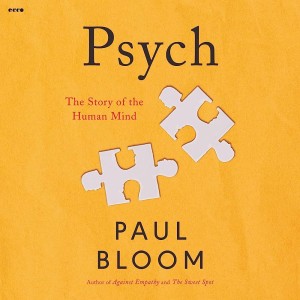 I should have known better! I was expecting just another in a long line of basic reiterations of Psychology 101. But this is Paul Bloom! — a talented storyteller and Psychology Professor at University of Toronto engaging a variety of audiences across genres from scientific publications to the New York Times while delivering other top sellers for the curious casual reader such as the Sweet Spot, Against Empathy, and How Pleasure Works. Now he brings us Psych: The Story of the Human Mind — a refreshed and captivating journey into the continually developing field of modern psychology. It transcends the genre of introductory texts by delivering a dynamic and engaging experience akin to enjoying a TED talk, feeding you savory narrative bits to share with friends and reengage your interest in forgotten figures.
I should have known better! I was expecting just another in a long line of basic reiterations of Psychology 101. But this is Paul Bloom! — a talented storyteller and Psychology Professor at University of Toronto engaging a variety of audiences across genres from scientific publications to the New York Times while delivering other top sellers for the curious casual reader such as the Sweet Spot, Against Empathy, and How Pleasure Works. Now he brings us Psych: The Story of the Human Mind — a refreshed and captivating journey into the continually developing field of modern psychology. It transcends the genre of introductory texts by delivering a dynamic and engaging experience akin to enjoying a TED talk, feeding you savory narrative bits to share with friends and reengage your interest in forgotten figures.
While this book was the result of the authors copious lecture notes from years of teaching, this is no dry retelling of psychology, he knows what engaged his students. He offers us deep understanding through human appeal and curiosity relegating your dry introductory psychology text to forgotten corners of dusty bookshelves.
This book serves as a compendium of psychological highlights reintroducing readers to the most influential figures in the field. From the groundbreaking insights of Anna Freud and B.F. Skinner to the revolutionary discoveries of Piaget, Kahneman, and Tversky. While hitting all the main branches and basics of the field, he also offers several often-neglected topics including a section on the controversial figure of Sigmund Freud, explaining why he is often omitted from Psychology courses and why it is important to notice him for his contributions to western culture and thought as well as his betrayals to science and humanity. Even very familiarly stories are filled with titillating narrative about famous individuals in the field. Including the social life and career of Phineas Gage: a famous case study who was impaled by a railroad spike, decimating parts of his frontal cortex. But he also brings an intriguing touch with his treatment of behaviorists such as John Watson, his marriage, and his impact on the American coffee break. This all topped off with discussions of fox-trotting pigs. And these are just some bits of juicy gossip from the first sections.
The book tackles a wide array of thought-provoking questions. From deciphering the intricate relationship between the brain and consciousness, to uncovering ethical controversies such as the Milgram experiments and the current replication crisis, the author leaves no stone unturned. The exploration extends to the origins of knowledge, the disparities between the minds of children and adults, the connection between language and thought, and the impact of biases on perception and memory. Moreover, the book thoughtfully delves into the rationality of human beings, the motivations that drive us, and the significance of emotions such as fear, disgust, and compassion. The author masterfully analyzes how we perceive others, including those from different social and ethnic backgrounds, while also addressing the complex interplay of personality, intelligence, and other traits. In addition, we are treated to his narrative rendition of both the causes and treatments for mental illnesses as well as the pursuit of happiness.
This book will feed your yearning to explore the depths of the human mind, leaving you with refreshed desire to unravel the mysteries of psychology.
I highly recommend this book to students of the mind as it contextualizes and updates much of what they are learning in the classroom and though our own exploration. It also becomes an essential companion for professors and instructors, reigniting their appreciation for the joy found in the history and storytelling of psychology. Even the most seasoned psychology instructor will discover new ways of presenting material and uncover juicy bits of social history that will captivate their students. This book unveils the identities of the remarkable individuals who shaped the field and the cultural movements they inspired, reminding us that psychology is not lists of facts about minds, its humans pushing the limits of our mind to make sense of ourselves.


